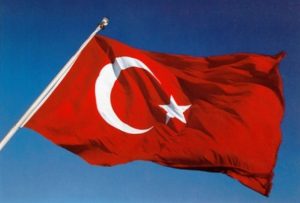
Ankara, rugpjūčio 9 d. (ELTA). Turkijos valdžia po „grūdų koridoriaus“ siūlys atidaryti ir „energetikos koridorių“ dujų tranzitui į Europą per savo teritoriją, kad padėtų sureguliuoti krizę, kurią sukėlė dujų tiekimo iš Rusijos ribojimas.
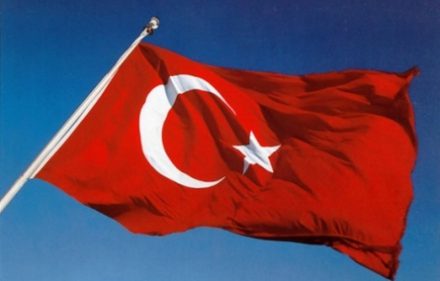

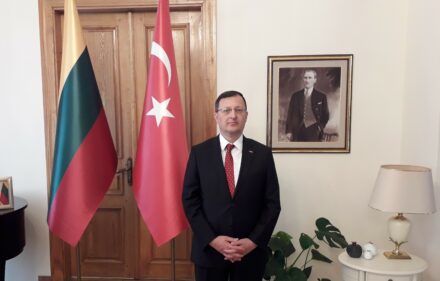
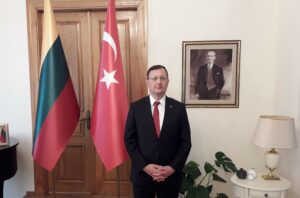
INTERVIEW WITH THE AMBASSADOR OF THE REPUBLIC OF TÜRKİYE GÖKHAN TURAN ON THE OCCASION OF THE 6th ANNIVERSARY OF THE JULY 15 COUP ATTEMPT
(BY JOURNALIST GINTARAS VISOCKAS)
Following the reconstitution of independence of Lithuania in 1990, Türkiye became one of the first countries to open a resident Embassy in Vilnius. In fact, when Türkiye opened its Embassy in Vilnius in 1992, this was the first and only Turkish Embassy in the newly independent Baltic countries. Turkish embassies in Estonia and Latvia were established much later. In modern times our first diplomatic agreement with Türkiye actually goes back to the 17 September 1930 Friendship Agreement. The interim period of Soviet occupation of Lithuania was never recognized by Türkiye. Thus, recognition after the reconstitution of Lithuanian independence was a natural step. Technically, diplomatic relations between these two countries had been established on 3 September 1991. In reality, we have a unique long history of acquaintance with the Turkish nation. It must be remembered that Turkish-Lithuanian relations go back as far as to the relations established between the Ottoman Empire and the Commonwealth of Poland and Lithuania, when at the time both states shared borders, had trade concessions and upheld strategic objective of maintaining balance of power in the East Europe and the Black Sea region.
As friends, and today also as allies we need to understand each other. So it would be appropriate to recognize that today has become an important day in the history of Turkish nation six years ago, when a coup attempt was staged against her democracy and elected Government of the day.
Can you highlight for the Lithuanians to understand better, what exactly has happened six years ago in Türkiye on July 15th , 2016?
The unfortunate and treacherous coup attempt that targeted Turkish democracy took place on July 15, 2016. This coup attempt was organized by a group of soldiers who were members of/or affiliated with the Fetullahist Terrorist Organization (FETO), aimed to assassinate the elected President Erdoğan, as well as to replace both the constitutional order and parliamentary democracy with a military junta.
Following the assault carried by FETO affiliates on Turkish democracy on that night of July 15th, next morning Türkiye woke up to a tragic scene. What occurred was a night of terror under the wrath of helicopter gunships, tanks and F-16 jets. The events resulted in the loss of lives of 251 people. Over 2500 of our people were maimed or wounded. The coup plotters, among various other places, bombed the Turkish Parliament, attacked the buildings of the Presidential Complex, the police headquarters and the National Intelligence Organization (NIO), targeted some media organizations and the Turkish Satellite Center (Turksat).
However, tens of thousands of unarmed civilians took to the streets of Turkish cities in masses to protect Turkish democracy and its legitimately elected Government, and clearly rejected the coup plotters. As a result of a rare epic resistance of a nation in world history, the coup attempt was repulsed decisively.
This was the most organized terrorist attack and murderous coup attempt, which Türkiye had ever been subjected to. Then U.S. Vice-President Joe Biden, on a visit to Türkiye after the July 15th coup attempt, would refer to the coup attempt as “Türkiye’s September 11th.”
To have an empathy, one needs to imagine a bewildering scenario of Lithuanian jet fighters bombing the Seimas, US war planes dropping bombs on Capitol Hill or German air force targeting the Bundestag; while helicopters firing on crowds of people gathering in front of the Presidential Office? This is actually what took place in Türkiye on that terrible night.
What was the scale of participation in this coup?
Over 10,000 military and civilian members of FETO organisation, 35 military planes, 74 tanks, 246 armoured vehicles, 3 military ships, 3992 weapons and 37 military helicopters participated and played a role in the coup attempt.
Our Parliament, presidential palace, and police headquarters were under fire — whilst Turks rallied in the streets and stood before the tanks. As a result of the immediate investigations undertaken by Turkish prosecutors, irrefutable evidence quickly emerged pointing to the Fetullahist Terror Organization (FETO) — a dangerous clandestine group within Türkiye and other countries around the world that has been nurtured by Fetullah Gülen over the past 40 years. Gülen today lives on an estate in Saylorsburg, Pennsylvania.
Who was behind the July 15th coup attempt?
Solid pieces of evidence obtained in the trials revealed that the power behind the treacherous coup attempt was the FETO organization. These substantial pieces of evidence include essential audio and video recordings of the coup night, correspondences between the coup plotters, other information and documents, confessions and witness statements of the captured coup plotters.
Who is FETO and what is the nature of this organization, which may be difficult to understand for an outsider?
To judge the deeds of FETO (Fetullahist Terrorist Organisation) only with what transpired on July 15th would be inadequate. The crimes committed on the night of July 15th were just the tip of an iceberg.
FETO is an armed cult organization made up of fanatic people who came together with the directives of their ringleader Fetullah Gülen. He is the so-called “messianic” leader of this clandestine terrorist organization. FETO is unprecedented in terms of its global reach, ambitions and methods. The ringleader Gülen is on the Ministry of Interior’s ‘most wanted terrorists list’s ‘Red’ category.
It all started under the guise of a charitable education effort back in the 1970s. Fetullah Gülen and his followers disguised themselves as a benign education movement, when they started the campaign of establishing schools in Türkiye and later around the world. At the peak of their power, they controlled thousands of schools in Türkiye and more than eight hundred educational institutions worldwide. In terms of their reach, they were unprecedented.
It is now understood that this was the first step of an infiltration campaign where children and their parents were recruited with the seemingly innocent promise of a better education and a good job. These children were often put through school with academic and financial help and a heavy hand in indoctrination. They turned into unquestioning foot soldiers of Fetullah Gülen who claims to be the “Chosen One”. The goal was to subvert the democratic foundations of the Turkish state and establish a new anti-democratic one under the absolute rule of Gülen. His students were made to believe that, in order to achieve their main goal of taking the control of the state, they should remain hidden and very cautious, and that they are allowed to avoid all ethical and religious rules and principles. Attaching great importance to confidentiality in its structure, and as „precaution” the organization allocates „code names” to its members apart from their real names to ensure secrecy. In this way, this is a unique and peculiar armed terrorist organization where even its lower level members know each other by their code names and has a „cell-type” structure.
For infiltrating public sector, there were mass-scale exam cheatings for critical government posts in many departments, particularly in Police Departments and Military Schools.
As its strength grew, the organization began to claim a global messianic mission, depicting Fetullah Gülen as the “Imam of the Universe”.
The crime syndicate behind all this, ran an integrated system that took care of recruitment through schools; financing was taken care of by holding companies and donations from often well intended business people. Inadequate checks and regulatory void was misused by the group to advance their agenda. The organization also established media houses to shape the public opinion for and against any person, entity or idea. Many people in Türkiye who saw the organization for what it really is, got psychologically and socially lynched through these media houses. These media houses became the focal point of lynch campaigns conducted against journalists, academics, bureaucrats and military officers who opposed them, or tried to expose them.
Turkish judicial authorities rendered numerous conviction decisions against members of this crime syndicate due to its various criminal acts, such as illegal wiretapping, fabricating evidence and unlawful arrests of those who opposed the organization. The ongoing and finalized investigations, prosecutions and trials yielded beyond doubt that Fetullah Gülen is the administrator and ringleader of FETO armed terrorist organization and that he gave the order to stage the coup.
As the Turkish Government understood what was actually in place, the necessary legal actions were taken against FETO. In particular, the disclosure of their secret communication systems were very instrumental.
July 15th was plotted at the time when the Turkish Government had discovered and listed most of the so-called military personnel who were actually recruits of FETO and thus was getting ready to dismiss them. In other words, it was a desperate final move by FETO to keep their influence and control in place in Türkiye.
15 July armed coup attempt irrefutably demonstrated that the FETO is one of the most dangerous groups against democratic governance.
Their presence and modus operandi is the same in education, NGOs and local businesses around the world. As they aim to infiltrate and enlarge their global economic and political influence, we think that they constitute a direct security threat for any country where they operate through affiliated people and institutions. Lithuania is not an exception to this. Türkiye will continue to explain and warn friends and allies around the world to be careful in relation to the ill-intentioned and poisonous activities of this crime organization.
What steps has Türkiye taken against this organization to preserve its democracy and stability?
In the past six years, the fight against FETO both inside and outside Türkiye has constituted one of the main priorities of our Government. Within Türkiye, our efforts are being conducted under three pillars:
Firstly, on the basis of the rule of law, the perpetrators of the 15th of July coup attempt have been brought to justice. Several judicial processes are still undergoing by relevant authorities, and investigations continue in relation to FETO in the country.
Secondly, FETO’s organizational structure within governmental institutions has been unveiled; administrative and judicial procedures have been initiated against its members and hence the “parallel state structure” has been brought down.
Thirdly, apart from those within the governmental institutions, FETO’s attempts to spread across all areas of the economy via its various shell entities in the education, media and banking sectors, have been thwarted.
In the meantime, FETO has undergone a significant transformation. The organization, which lost its backbone in Türkiye, is now trying to survive by making use of its organizational structure abroad. Considering the nature of this clandestine entity, at least a well focused medium term perspective is called for fighting against FETO abroad. Thus, this has aspect has gained more significance.
For these reasons, the fight against FETO structures abroad has been among the top priorities of our government. Our efforts can be summarized as follows:
a) The main objective of our efforts is to raise awareness in other countries against this group. Several international organizations have adopted vital resolutions regarding FETO. Moreover, countries that have investigated and monitored this group have often found that they are involved in crimes such as money laundering, intimidation, bribery and passport/visa fraud.
b) We have requested the extradition and the freezing of the assets of FETO members from the countries where these persons are located.
c) The Turkish Maarif (Education) Foundation also maintains its activities around the world to prevent any shortfalls resulting from the steps taken against FETO, especially in the field of education. In addition to FETO affiliated schools being taken over by the relevant education bodies in almost 49 countries, in more than 19 of these the affiliated schools and education centers have been transferred to the Turkish Maarif Foundation. Also, Turkish Maarif Foundation has opened schools in over 30 countries.
Who saved democracy on that evening in Türkiye?
There are two key factors that prevented the successful conclusion of the 15 July coup. One of these was the fact that FETO members within the military began the coup two hours earlier than planned because they suspected that the National Intelligence Organization and Turkish Army Headquarters had become aware that something was going to happen. However, the main factor was surely the resilience of the Turkish people against this anti-democratic attempt to topple the elected government. In this they took to the streets responding to the call of President Erdoğan for democratic solidarity. There were dozens of democracy vigils in Turkish cities which were attended by millions of our citizens from supporters all of the political spectrum.
After the attempted coup, President Erdoğan, Prime Minister Binali Yıldırım and leaders of opposition parties came together in a mass rally on 7 August 2016 in İstanbul. This mass rally was a historical expression of national resolve and the first case in which all parties gathered in a political rally for a common cause. Participation of over 3 million Turkish citizens has also made this rally one of the most crowded rallies in recent Turkish political history.
Religious leaders of all faiths in Türkiye, Moslems, Christians and Jewish were all united in their condemnation of FETO’s coup attempt and issued a joint statement. In summary, the will and resolve of Turkish people at large saved Turkish democracy and the constitutional order.
As part of the same alliance, Lithuania and Türkiye are both NATO members. what are some of the challenges facing us both today?
Since Lithuania became NATO member in 2004, the Alliance’s understanding of threats have changed. For instance, we increasingly talk about threats to democracy and stability through hybrid threats and also cyber security. It is interesting to note that the FETO organisation was rather capable in posing a threat to democracy via their cyber security capabilities, too. These type of new challenges do not recognize any boundaries. We need to develop awareness and capabilities to encounter them with appropriate resilience.
In the last several years in NATO and in Europe at large, there is a growing awareness on hybrid threats and their components. While technological advantages help overcoming hybrid threats, stronger general awareness and resilience capabilites of democratic instituitons are definetely needed. Disinformation, fake news and propaganda have become tools of manipulation for extremist and many other marginal groups. Stronger media literacy is required in order to meet these challenges.
Having higher awareness of regional threats will also contribute to enhancement of the quality of security. As for Türkiye, we recognise the significance of regional security for Baltics. Thus, we contributed last year again to the Baltic Air Policing Mission with four F-16 jets; we provide financial and personnel support to the NATO Energy Security Excellence Center in Vilnius in addition to other cooperation forms in NATO.
As regards our overall national security concept, rule-based and predictable international order is the preferred environment for both our states, for enhanced democracy and welfare of our people.
What is the cooperation potential between our countries in other areas?
As highlighted earlier, we are not only members of the NATO alliance, we are also allies in our mutual values of democracy, secular rule of law, freedom of speech, free market economy and way of life respectful to one’s faith.
While you have become a member of the EU, Türkiye’s long accession process is still under way. Although the negotiation process has been stalled for several years now, we aspire to become full member of the EU in due course. We are part of European historical and cultural landscape, bearing in mind Europe is a heterogeneous entity. Political wisdom and strategic outlook is needed to transcend some of the exisiting blockages. Still we have broad-based cooperation emanating from several official agreements, including Customs Union with the EU. Lithuania’s support towards Türkiye’s EU membership bid, based on her unique experience is much appreciated in Türkiye. We would prefer it to be more vocal and noticable. What is happening in Ukraine is a reminder for all to see that instability is a sensitive issue in the Black Sea region. Peace and stability cannot be taken for granted. Healthy and visionary Euro-Atlantic integration is a key to wider regional peace and prosperity.
We have supported Lithuania’s bid for practically every regional and global organization in the last 30 years. Our support for your NATO membership process was perhaps the most important among them for transitioning to democracy after Soviet era.
In economic relations, our bilateral potential is under-utilized. Despite Covid-19 pandemic conditions, our yearly bilateral trade volume has reached 992 million Dollars. Türkiye is the 7th largest economy in Europe and 19th in the world. It offers great opportunities for Lithuanian businesses. There also need to be more awarenes on opportunities Lithuania offers to Turkish business people. Our economies can be considered mutually complementary in many aspects. For instance, in terms of logistics and transportation both countries can function as regional hubs for each other.
There is a huge potential in defence industry cooperation. A wide range of Turkish defence industry products, especially state of the art Turkish civilian and military drones may be interesting for Lithuanian army and security institutions. The latest venture of a Bayraktar drone which was given as a gift from the Turkish producer, the Baykar company to Lithuania, and is being donated by Lithuania to Ukraine indicates this potential.
On another front, more Turkish students are discovering global education opportunities through various programs such as “Erasmus”. Lithuanian universities’ English programmes are very popular among Turkish Erasmus students.
Historically, we have people to people connection via Lithuanian Tatars and Karaim communities. We have a large Tatar community from Crimea in Türkiye as well.
We are also happy to see that Türkiye is traditionally among the most preferred destinations for Lithuanian tourists. Hundreds of thousands Lithuanians visit Türkiye each year. We welcome people to people contact, look forward to developing our mutual potential further.
2022.07.15; 10:00
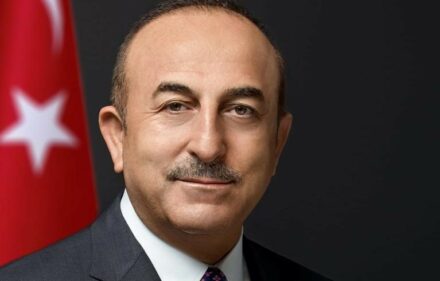

Mevlüt ÇAVUŞOĞLU, Minister of Foreign Affairs of the Republic of Türkiye
On the evening of July 15, 2016, the “Fethullahist Terrorist Organization” (FETO) launched a bloody coup attempt against the people and the government of my country. Their aim was to establish a radical, fundamentalist regime, loyal only to their ringleader Fetullah Gülen.
As FETO affiliated army units left their barracks to occupy key locations, such as the Bosphorus Bridge in Istanbul and fighter jets and attack helicopters bombed strategic targets including the Parliament, Presidential compound, army and police headquarters; thousands of civilians took to the streets to stop this unprecedented heinous coup attempt. The plotters killed 251 innocent civilians and left thousands injured. On that night the Turkish people defended democracy with their lives. This heroic response was something the conspirators did not foresee.
To understand what transpired, one has to understand the true nature of FETO. FETO was established in the late 1960’s as a so-called “religious movement”. In the guise of promoting education and inter-religious dialogue, it managed to cover its malign intentions.
The well-planned and wide-spread infiltration by FETO members and converts into the army, law enforcement, judiciary and numerous government institutions, including my Ministry, was carried out for decades clandestinely for an overarching plan, of which the final phase was unleashed on July 15, 2016.
Had the coup attempt succeeded, there would have been a very different Türkiye today. Democracy would not have existed and fundamental rights and freedoms would have been suspended indefinitely. The nation would have fallen in the hands of an extremist government.
FETO not only controlled a significant portion of educational institutions, but also owned numerous financial institutions. Their bank accounts were fed by prominent FETO members in industry and commerce, as well as by officials and members of the public. Many innocent civilians were also lured into contributing to FETO’s finances as their piety was manipulated. The enormous income driven from their schools around the globe was channeled into these accounts clandestinely waiting for their ultimate move.
Following the bloody coup attempt of July 15, 2016, a resolute cleansing of the public sector, including government institutions and the military, as well as of the private sector from all FETO affiliated persons and companies was initiated. Some prominent conspirators have been apprehended. Others escaped justice and found refuge in foreign countries. The head of the FETO terrorist organization, Fethullah Gülen, still resides in the United States. Our government has been requesting the extradition of Gülen to Türkiye from the United States as well as that of FETO members from European countries for years. Unfortunately, these requests have not been fulfilled yet.
On the other hand, elsewhere in the world, an increasing number of governments understand the danger this terrorist organization also poses to them and are taking the necessary steps. FETO is also engaged in illegal activities such as visa fraud, money laundering and arms trafficking. Consequently, FETO members are being cleared from public and private sectors in many countries. Many schools affiliated with this terrorist organization abroad have been transferred to the Turkish Maarif Foundation after 2016. Today, Maarif Schools are functioning in many countries and are providing excellent education worldwide.
The nature and scope of Türkiye’s fight against FETO is no different than that exercised by other countries against organizations which had terrorized officials and civilians alike, and endangered democratic values, fundamental rights and freedoms. Türkiye is doing what the respective countries in their fight against terrorism have done in the past. All procedures are in compliance with law.
Terrorism does not have a nationality, ethnicity or religion. This menace threatens humanity as a whole. Therefore, the response to this threat must be united and determined. No state has the luxury to differentiate between terrorists and no terrorist organization can be classified as “useful” according to preferences. FETO is responsible for the loss of hundreds of lives as well as other grave crimes against the Turkish people. Six years after July 15, 2016, Türkiye continues its resolute fight against FETO, just as it continues its fight against other terrorist organizations such as the PKK, PYD-YPG, DHKP-C and DAESH.
We expect the international community to stand in solidarity with Türkiye in the fight against terrorism.
2022.07.13; 08:00

